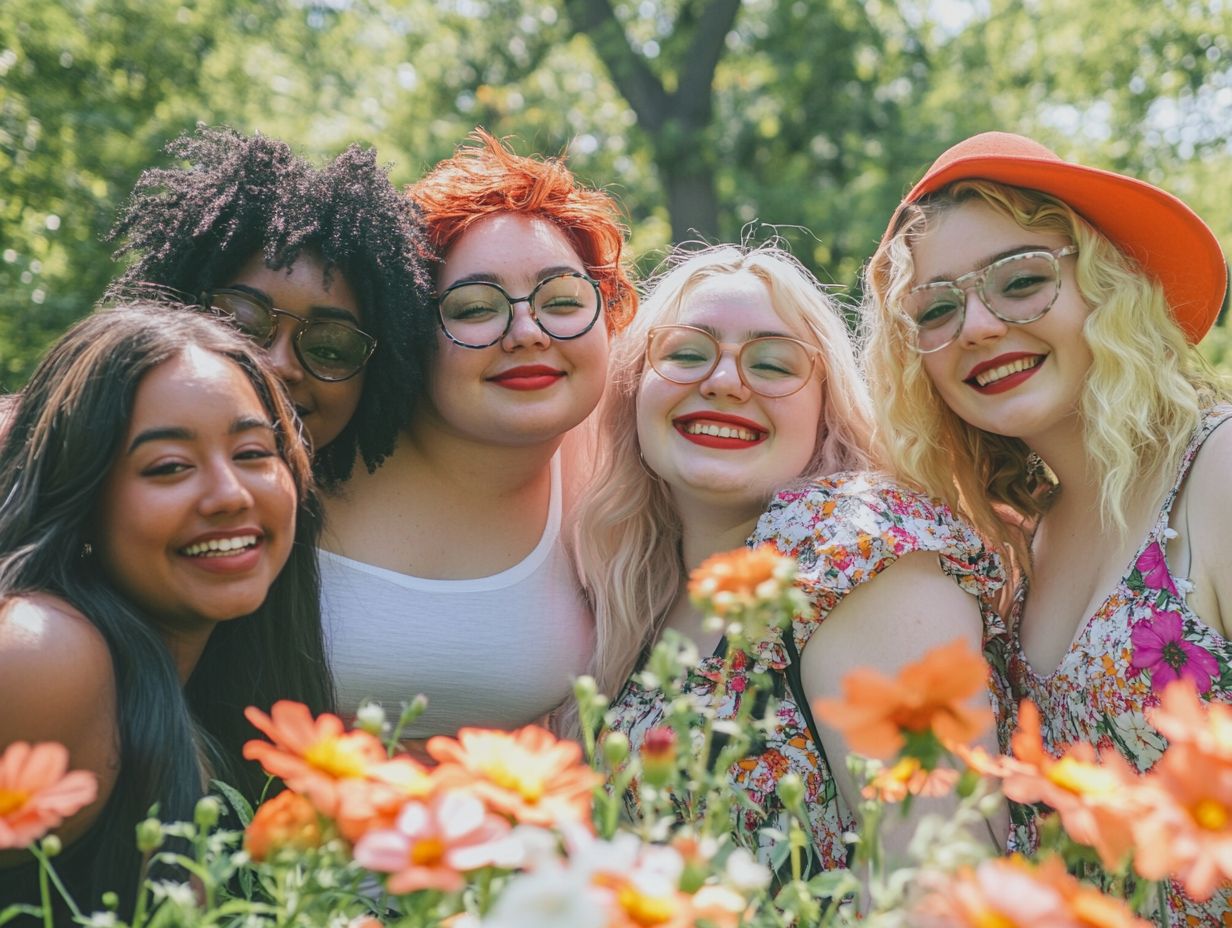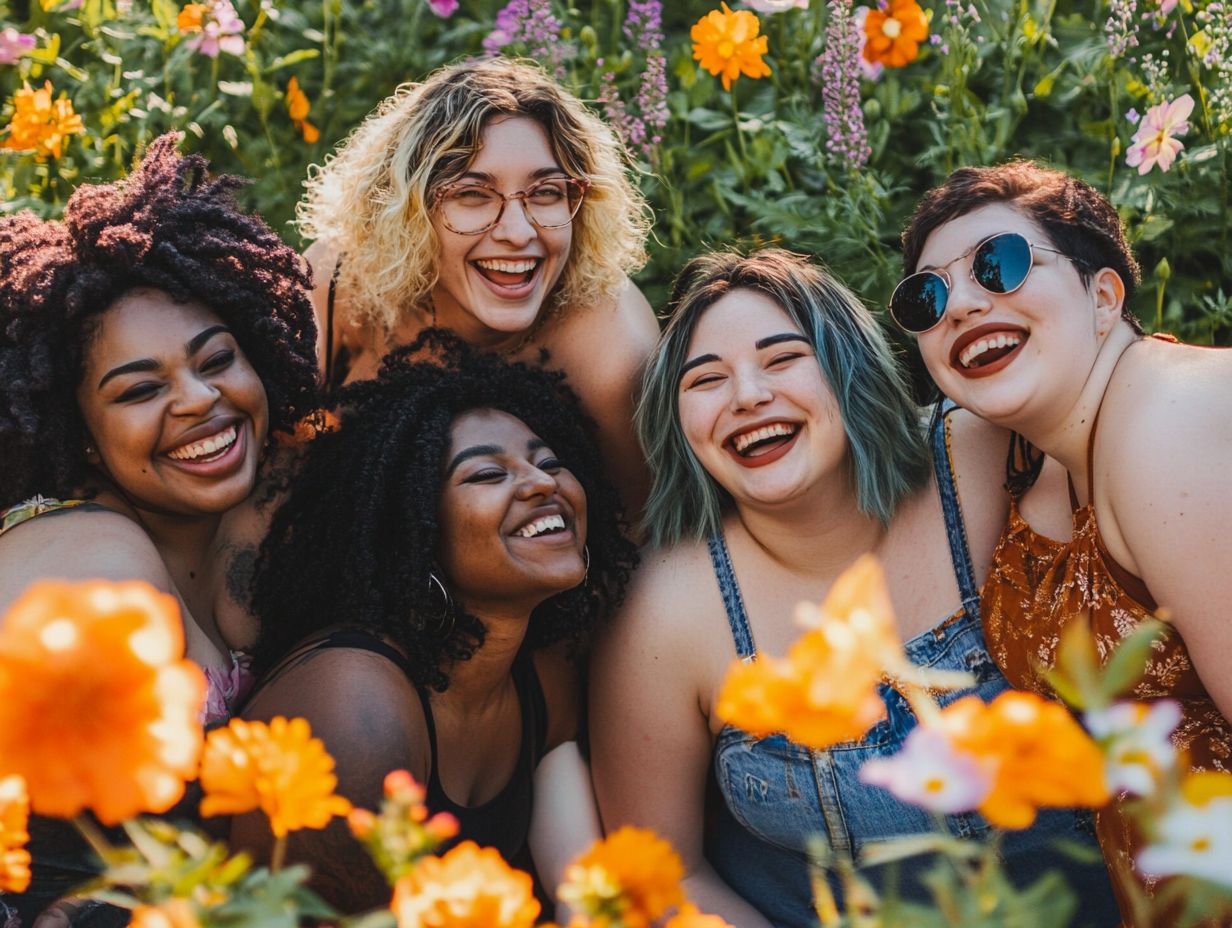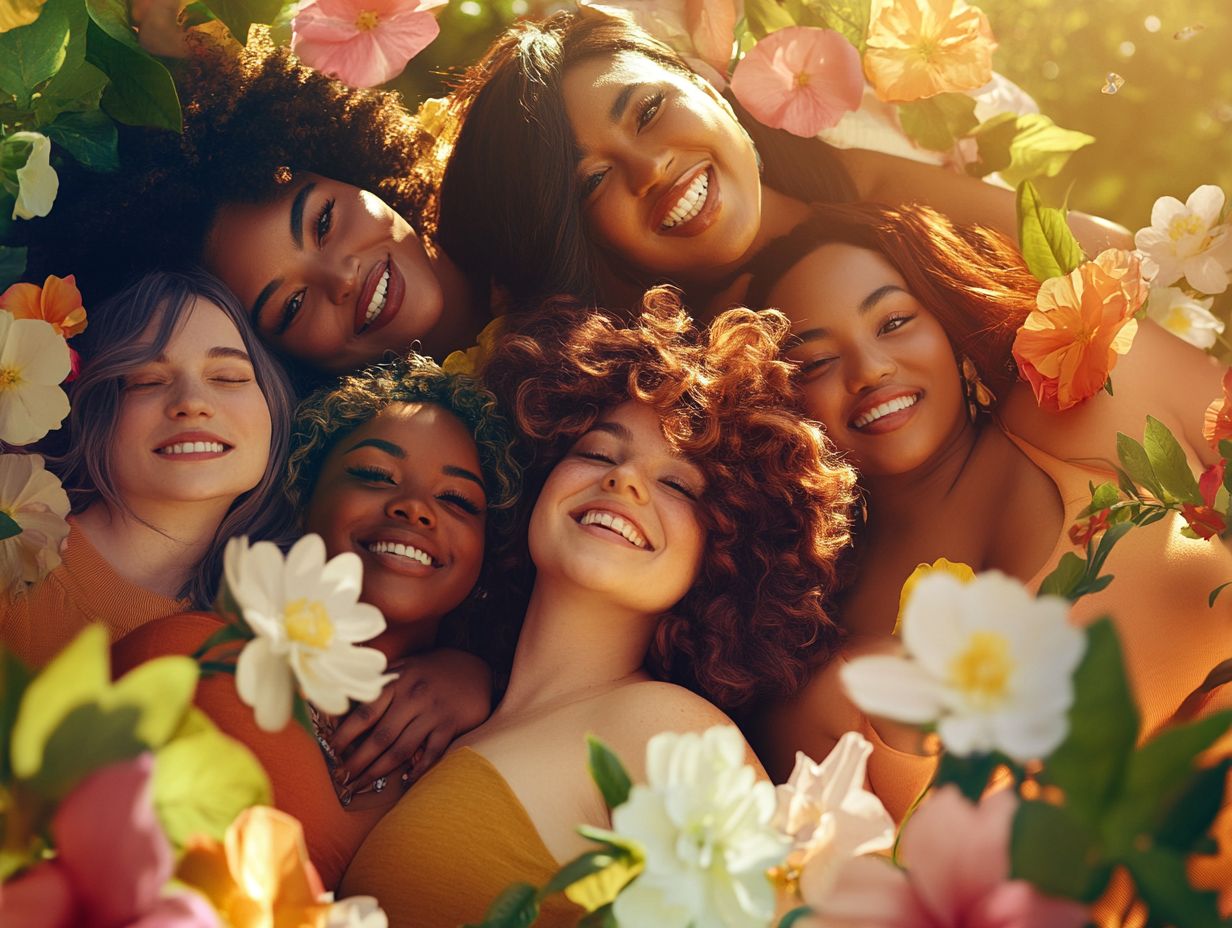In a world where beauty standards are pervasive and often unrealistic, the pressure to conform can be overwhelming.
This article delves into the complex dynamics of beauty ideals and their significant impact on society.
It explores the rise of body positivity, emphasizing its principles and the vital role of self-acceptance in promoting mental well-being.
Additionally, the article discusses the importance of challenging conventional beauty norms, celebrating diversity, and using social media as a tool for positive change.
Join us as we uncover practical steps towards embracing self-love and reshaping our perspectives on beauty.
The Impact of Beauty Standards on Society

Beauty standards have a significant social impact on society as they shape perceptions of self-worth, body image, and individual self-esteem. Often propagated by media and social platforms, these standards create narrow definitions of beauty that frequently exclude diversity and authenticity.
Consequently, many individuals struggle to achieve body acceptance and self-love, which can lead to issues such as body shaming and weight stigma. The societal pressure surrounding beauty standards can negatively affect mental health, particularly among marginalized groups.
It is essential for society to move toward enableing individuals to embrace a broad spectrum of body positivity and to build an inclusive community that celebrates all bodies.
How Beauty Standards are Defined and Perpetuated
Beauty standards are societal norms that define what is considered attractive, often reinforced by media sources such as television, advertising, and social media platforms. These outlets highlight specific physical traits as desirable and foster a culture of comparison, prompting individuals to evaluate their self-worth against often unrealistic ideals.
The images and messages presented can have a detrimental effect on body image, resulting in feelings of inadequacy and low self-esteem. As people adopt these narrow definitions of beauty, they frequently struggle with self-acceptance, which can perpetuate a cycle of harm.
The media’s portrayal of beauty significantly influences public perceptions, making it essential to question and transform these long-established standards.
The Rise of Body Positivity
The body positivity movement is a response to traditional beauty standards, advocating for self-love, acceptance, and the celebration of body diversity across all shapes, sizes, and identities. It posits that beauty is not confined to a specific ideal; rather, it encompasses the ability for individuals to embrace their unique features.
In recent years, body positivity has gained significant prominence, particularly through social media platforms that amplify diverse voices and challenge damaging stereotypes, thereby fostering an environment of enablement and activism. Authentic self-expression and acceptance are central to the movement, with the ultimate goal of reshaping societal expectations of beauty.
Defining Body Positivity and its Principles

Body positivity is the concept that all bodies deserve love, respect, and acceptance, regardless of size, shape, or appearance. It promotes self-love and challenges the narrow definitions of beauty that can lead to body image issues and low self-esteem. The body positivity movement is grounded in the principles of inclusivity, authenticity, and enablement, inspiring individuals to embrace their identities and practice positive self-affirmations about their bodies. This movement encourages diverse representation and aims to combat weight stigma and beauty myths perpetuated by the media.
Body positivity is crucial for personal development and overall wellness, as it creates a validating environment for many individuals. When people internalize the main tenets of this movement, they often experience improvements in their mental health; accepting themselves can alleviate feelings of anxiety and depression that are frequently linked to their self-perception.
Media representation that showcases diverse bodies and experiences fosters a sense of belonging and relatability among viewers, reinforcing the idea that beauty is not confined to a specific type of person. This inclusivity allows for a wide range of stories to be told, helping individuals recognize their own value and promoting a healthier attitude toward themselves and their bodies.
The Importance of Self-Acceptance
Self-acceptance is crucial for mental health as it influences our body image, self-esteem, and emotional well-being. By learning to embrace ourselves, including our flaws and imperfections, we can cultivate a greater sense of self-love and build a stronger resilience against societal and beauty standards.
Moreover, the journey toward self-acceptance is often closely linked to personal growth and self-discovery, enabling individuals to gain a deeper understanding of their self-worth that is independent of external validation. This practice not only enhances mental health but also promotes holistic wellness, ultimately fostering healthier relationships with others.
Why Self-Acceptance is Crucial for Mental Health
Self-acceptance is crucial for mental health as it enables individuals to combat negative body image and low self-esteem, both of which are exacerbated by societal weight stigma and unrealistic beauty standards.
By embracing their true selves, people experience greater emotional well-being and a stronger sense of belonging and purpose. Self-acceptance fosters resilience against the detrimental effects of body shaming, which often triggers feelings of unworthiness.
Moreover, self-love can mitigate the impact of mental health issues such as anxiety and depression and is associated with a more positive mindset. Individuals who accept themselves are more likely to engage in healthy behaviors, cultivate meaningful relationships, and seek help when needed, all of which enhance their overall quality of life and emotional health.
Challenging Beauty Standards and Embracing Diversity

Challenging beauty standards is essential for fostering a culture of diversity and inclusivity, allowing individuals to embrace their unique identities and reject societal restrictions.
Advocating for representation in all forms of media ensures that marginalized voices are heard and creates a more accepting environment that promotes body positivity.
The anti-beauty standard movement encourages non-conformity and self-expression, enableing individuals to redefine beauty on their own terms and inspire social change within their communities.
These actions cultivate acceptance, which in turn enhances confidence and self-worth among individuals from all backgrounds.
Promoting Inclusivity and Representation
Promoting inclusivity and representation is crucial for dismantling harmful beauty standards and fostering a society that embraces body diversity. Featuring a wider range of body types, skin tones, and identities in the media can help reshape societal standards of beauty.
One of the most recognized campaigns challenging traditional norms is Dove’s Real Beauty campaign, which encourages individuals to embrace their unique traits and fosters a strong movement for self-acceptance and enablement. Lizzo is another prominent figure advocating for body positivity, utilizing her platform to convey the message that beauty is diverse and can take many forms.
These examples demonstrate that thoughtful representation has the power not only to enable individuals but also to promote collective acceptance within society, allowing everyone to feel recognized and valued.
Practical Steps Towards Self-Acceptance
Taking positive steps toward self-acceptance involves engaging in self-care and cultivating self-love. Self-acceptance is essential for developing healthy relationships with oneself, as well as for promoting emotional wellness and a sense of self-worth.
It can be nurtured through positive self-care practices and mindfulness techniques that encourage self-love and self-compassion. Additionally, using positive affirmations can help reinforce healthy, uplifting conversations within ourselves, which may reduce negative thoughts and feelings, ultimately leading to improved self-esteem.
Tools and Techniques for Building Self-Acceptance

Self-care, mindfulness, and positive affirmations are essential tools and techniques for fostering self-acceptance and enhancing emotional health. Among these, journaling stands out as one of the most impactful methods, offering individuals a private outlet to explore their feelings and thoughts without fear of judgment.
By dedicating just a few minutes each day to writing, individuals can assess their progress and gain insight into their emotional landscapes. Meditation is another powerful practice that helps build self-awareness and deepen understanding of one’s thoughts and feelings.
Additionally, community support plays a crucial role; engaging with others who share similar experiences can provide motivation and validation, reinforcing the idea that everyone faces challenges with self-acceptance at some point.
When simple tools like these are integrated into daily life, they can significantly aid in an individual’s journey toward self-acceptance.
The Role of Social Media in Shaping Beauty Standards
Social media significantly influences beauty standards by serving as both a platform for expression and a source of comparison, affecting body image and self-acceptance.
While it can perpetuate unrealistic beauty ideals, it also provides a space for enablement and activism, where diverse voices challenge harmful beauty narratives and promote body-positive movements.
The representation of various body types, ethnicities, and identities on social media contributes to a broader understanding of beauty, fostering self-love and positive affirmations among users.
The Positive and Negative Effects of Social Media on Body Image
Social media has both positive and negative effects on body image, influencing perceptions of beauty and self-acceptance in various ways. On one hand, it can exacerbate unrealistic beauty standards through curated images that often reflect a narrow definition of beauty. This can lead to feelings of inadequacy among individuals who strive to conform to these standards. Such continuous exposure can worsen body image issues and mental health problems, making it difficult for some to celebrate their individuality.
On the other hand, social media can enable users by allowing them to create and share diverse representations of beauty and build supportive communities. These spaces can promote values of self-love and acceptance, enhance positive mental health, and reinforce the idea that beauty is multifaceted, which can be beneficial in combating harmful stereotypes.
Celebrating Body Positivity and Self-Love
Celebrating body positivity and self-love is essential for promoting a healthy body image and fostering self-acceptance within our communities. This can be achieved by sharing inspiring stories, participating in body-positive movements, and offering positive affirmations.
Embracing body diversity enables individuals to appreciate their uniqueness and challenges harmful beauty standards that have historically marginalized many identities. Such celebrations not only enhance emotional well-being but also cultivate a supportive community for everyone.
Inspiring Stories and Resources for Embracing Body Positivity
Inspiring stories and resources that promote body positivity play a crucial role in individuals’ journeys toward self-love and acceptance. These narratives highlight diverse voices and experiences, encouraging people to confront societal norms and expectations related to body image.
Organizations such as The Body Positive and the #BodyPositivity movement advocate for loving and appreciating one’s body, regardless of appearance. Prominent advocates like model Ashley Graham and actress Jameela Jamil frequently discuss size inclusivity and challenge traditional beauty standards, bringing these important conversations into mainstream media.
For those seeking further inspiration, books like “The Body Is Not an Apology” by Sonya Renee Taylor and campaigns like Aerie’s Aerie Real provide valuable insights. Additionally, social media platforms feature accounts such as @bodyposipanda and @thebirdspapaya, which promote positive body image messages while fostering a sense of community and acceptance.
